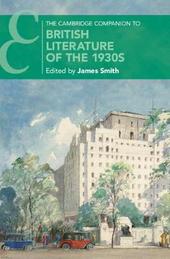
|
The Cambridge Companion to British Literature of the 1930s
Hardback
Main Details
| Title |
The Cambridge Companion to British Literature of the 1930s
|
| Authors and Contributors |
Edited by James Smith
|
| Series | Cambridge Companions to Literature |
|---|
| Physical Properties |
| Format:Hardback | | Pages:268 | | Dimensions(mm): Height 235,Width 156 |
|
| Category/Genre | Literary studies - from c 1900 -
Literary studies - fiction, novelists and prose writers |
|---|
| ISBN/Barcode |
9781108481083
|
| Classifications | Dewey:820.900912 |
|---|
| Audience | | Tertiary Education (US: College) | | Professional & Vocational | |
|---|
| Illustrations |
Worked examples or Exercises
|
|
Publishing Details |
| Publisher |
Cambridge University Press
|
| Imprint |
Cambridge University Press
|
| Publication Date |
19 December 2019 |
| Publication Country |
United Kingdom
|
Description
The 1930s is frequently seen as a unique moment in British literary history, a decade where writing was shaped by an intense series of political events, aesthetic debates, and emerging literary networks. Yet what is contained under the rubric of 1930s writing has been the subject of competing claims, and therefore this Companion offers the reader an incisive survey covering the decade's literature and its status in critical debates. Across the chapters, sustained attention is given to writers of growing scholarly interest, to pivotal authors of the period, such as Auden, Orwell, and Woolf, to the development of key literary forms and themes, and to the relationship between this literature and the decade's pressing social and political contexts. Through this, the reader will gain new insight into 1930s literary history, and an understanding of many of the critical debates that have marked the study of this unique literary era.
Author Biography
James Smith is a Reader in English Studies at Durham University. His most recent book was British Writers and MI5 Surveillance, 1930-1960 (Cambridge, 2013). He has published widely on other aspects of 1930s literature and culture, such as on the censorship of 1930s film societies, and on government surveillance of radical literary magazines during the decade.
Reviews'Brilliantly conceived, constructed and executed, Smith's collection is an outstanding one.' Alistair Davies, Textual Practice
|